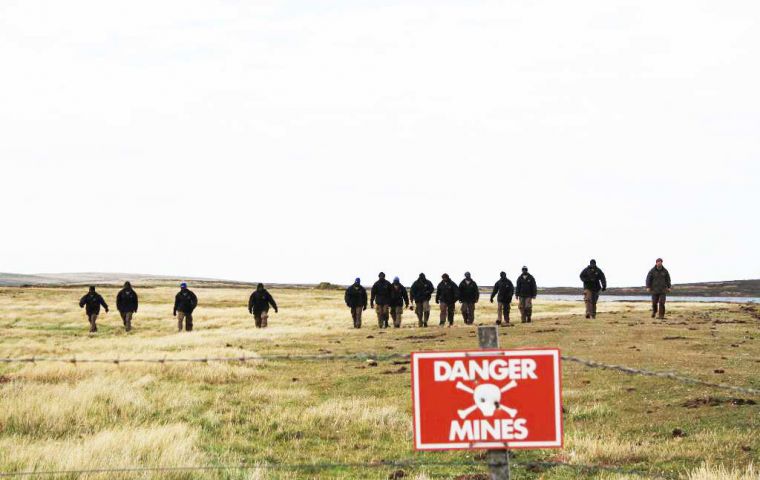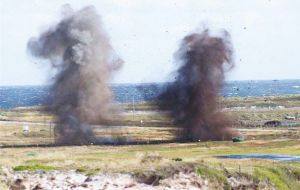MercoPress. South Atlantic News Agency
Falklands' clearance of Argentine mines 33 years later reported in UK
 The latest phase of the project is now underway after launching a few weeks ago in September, with much of the work in areas surrounding the capital, Stanley.
The latest phase of the project is now underway after launching a few weeks ago in September, with much of the work in areas surrounding the capital, Stanley.  Stanley was the last Argentine stronghold as UK forces took back the Falklands but the Argentines as they retreated, laid minefields all around the area
Stanley was the last Argentine stronghold as UK forces took back the Falklands but the Argentines as they retreated, laid minefields all around the area Explosive mines planted by retreating Argentine forces as Royal Marines stormed the Falklands during the 1982 conflict are still being cleared on the Islands, 33 years later, according to a report credited to David Wells from Westernmorningnews.
The latest phase of the project is now underway after launching a few weeks ago in September, with much of the work concentrated in areas surrounding the capital, Stanley.
Port Stanley had been the last Argentine stronghold as British forces took back the Falklands but the Argentine divisions, as they retreated, laid minefields all around the surrounding area.
Mines left behind after conflicts pose grave threats for local populations and visitors to the areas long after the warfare is over, in this case more than three decades since the conflict ended.
Britain-based explosive ordnance disposal and mine clearance company Bactec International, which operates all over the world, has been called in to make the Falklands safe after being awarded the contract by the Foreign and Commonwealth Office.
The company now has its teams on the ground in the Falklands working on phase four of the project. The teams had been involved in earlier phases of the program to rid the Falklands of mines which have been staged over the last few years.
John Hare, BACTEC Project Manager, told Falklands Island TV that his demining teams have been probing towards the middle of the minefields to try to pick up the “minefield pattern” that they already know exists from looking at records kept by the Argentine forces.
It was through these minefields that the Royal Marines from Plymouth-based 42 Commando managed to move, undetected, in freezing temperatures and under moonlight on the night of June 12, 1982, when the brigade launched its now legendary assault at Mount Harriet – a surprise attack to catch out the enemy at their rear.
The marines were quickly engaged in close contact, but pushed forward despite facing strong resistance from Argentine forces and continuous artillery bombardment as the battle raged overnight.
However, as dawn broke the next morning, more than 30 enemy soldiers had been killed, with more than 300 prisoners taken, before the Royal Marines finally secured Mount Harriet - with only the loss of two of their own.
For the bravery shown in the attack, the unit was awarded one Distinguished Service Order (DSO), one Military Cross, four Military Medals, and eight men were mentioned in dispatches.
The assault gave the British forces the push they needed to eventually achieve their main object – to take back Port Stanley. However, the legacy of that conflict is still posing a danger as Argentine mines still litter the land around Stanley.
Bactec’s teams of de-miners have been working to clear mines in the area south of Sapper Hill, Pony’s Pass and at Eliza Cove Bay as well as areas around Wall Mountain, where 42 Commando Royal Marines fought as they took Mount Harriet – and in the area around Mile Pond on the islands.
So far the teams have worked on about 11 minefields in this area and the area around the road leading to Mount Pleasant Airport.
Kevin Kneebone, the company MD, told the Falklands TV crew that his teams were using an armored machine specially developed for boggy ground conditions, used in the Falklands for the first time, which flails the ground to cut a lane through the minefield. Manual demining teams then go in to clear the rest of the minefield – making the area safe and free from future threats of explosions.
Mr. Kneebone said the teams hope to complete the latest phase of the project by December this year.




Top Comments
Disclaimer & comment rules-

-

-

Read all commentsCongratulations and thanks to Bactec. No matter the safety precautions, mine clearance is dangerous unless the method involves blanket explosions. Thank you Bactec for working to make British land safe for British people.
Oct 08th, 2015 - 11:54 am 0Could you consider replanting the mines where argies can tread on them?
Indeed this is great work being accomplished, professionally and safely, by Bactec, both by management and field workers who are inflicted by the brunt of Falklands weather. Returning recreational land for citizen access is a fantastic bonus, and better it is done in a controlled and systemic way by Bactec, than on some loose, never delivering, Arg promise.
Oct 08th, 2015 - 01:04 pm 0If Argentina had a conscience, they would pay the Bactec bill.
Oct 08th, 2015 - 02:52 pm 0But they don't.
Commenting for this story is now closed.
If you have a Facebook account, become a fan and comment on our Facebook Page!